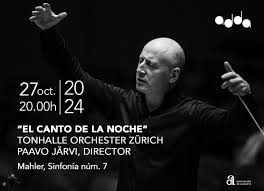A concert program that devotes 77 minutes to a single
work is not commonly encountered. Yes, there are the symphonies of Mahler and
Bruckner and Shostakovich, but what else would commonly occupy such a length of
time? It was with some excitement that this big event was anticipated.
The bill was, without question, up to the challenge. Zurich’s
Tonhalle Orchestra is certainly one of the world’s leading orchestras, and Paavo
Järvi’s name could not be bigger in the world of conducting. This particular Mahler
Symphony, number seven, is one that I last heard in live performance in a
concert over fifty years ago on London’s South Bank. So even the torrential
rain in Alicante that surrounded this evening could not damp the enthusiastic
anticipation.
Well, did the evening live up to the expectation? Of
course it did. The performance was faultless, even brilliant at times, even if
it could be argued the Paavo Järvi’s tempo in the faster sections of the first
movement could have been a little faster. The
overall impression, however, was that the contrasted were stark but never grotesque.
This is truly sophisticated music that almost constantly surprises the listener,
and it must be expertly played to make sense. The Tonhalle Orchestra took every
challenge in its substantial stride and in this variation-like movement, one
could not even hear the joins.
Mahler 7 is a groundbreaking symphony in many ways,
not least in its structure. A first movement that is alternatively fast and
then reflective lasts for 22 minutes. Its loose variation form revisits the
same material, but Mahler’s imagination keeps the sound fresh throughout, never
in the slightest repetitive. The central section of the movement, that
momentary vision of marital bliss, does eventually disintegrate to chaos.
The finale is Mahler perhaps at his most optimistic.
The movement seems to dance several waltzes along the way, but overall the
feeling is that everyone is having a good time, even though the dance may seem
to have a strange shape here and there.
The central scherzo is a very strange experience. Mahler
more often than not uses the scherzo to be loud, abrasive, even cynical. But in
the seventh, it seems more like a bad dream half-remembered. In between two movements,
entitled Night Music, it sounds as if the composer was trying to get to sleep, then
nodded off for a short time and dreamt, and then woke up before dawn to lie
awake again. The night music movements are perhaps stranger than the scherzo,
given their placement after a grand opening and before a triumph for
conclusion. Overall, Mahler’s seventh seems like an inverted arch, with a
keystone sticking up annoyingly in the middle to stop listeners from sliding
down or up.
On a thoroughly successful evening, when the concert
received rapturous applause from its audience, I find the need again to praise
the ADDA audience for being such wonderful listeners. It’s as if this audience
actually absorbs the music.




